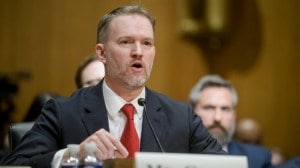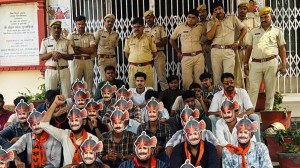Kesri, one of the greatest survivor in Indian politics
NEW DELHI, OCT 25: One of the greatest survivors in Indian politics, Sitaram Kesri had perfected the art of being at the right place at th...

NEW DELHI, OCT 25: One of the greatest survivors in Indian politics, Sitaram Kesri had perfected the art of being at the right place at the right time but an apparent attempt at the most powerful office, that of the Prime Minister, eluded him as his strategy misfired in 1997.
Known for his acumen in reading the political barometer and firming up strategies as a backroom boy, Kesri always managed to hitch on to the bandwagon of the winning side.
It was this horse sense which enabled the wily politician from Bihar’s Danapur to hold the key to the treasury of the country’s oldest political party for a record period under three party chiefs and later saw his elevation as party president taking over from another non-Nehru-Gandhi family leader.
A tribute to Kesri’s honesty and apt handling of the party funds was the absence of any charge of irregularities against him even by his harshest detractors. He served as Congress party’s treasurer for 17 long years.
Born to a trader Bulkan Shah belonging to the backward Kesarwani caste, Kesri appeared on the national political scene in mid-60s when he was spotted by Indira Gandhi.
He, along with former Railway Minister L N Mishra, took charge of the party in Bihar when Congress suffered a split in 1969 and seven years later Kesri was made the state unit Chief, a measure of the trust Indira Gandhi had in him.
Since then, there was no looking back for the erstwhile Dal drum-beater who pushed his way up to occupy the crucial posts of Congress President as well as leader of Congress Parliamentary Party simultaneously.
He certainly made more than ordinary efforts to climb the ladder surviving the caste politics of Bihar as also the cut-throat rivalry in the party. It was, however, a mess of his own making in 1997 when Kesri, armed with the two posts of Congress chief and CPP leader, thought Prime Ministership was at arms length and withdrew the party’s support to the United Front Government headed by H D Deve Gowda.
On a placid summer Sunday, Kesri created a political storm when he went to the late President S D Sharma and gave a letter withdrawing his party’s support to the United Front Government headed by Deve Gowda expecting the Front to crack and an opportunity for him to get the coveted post.
However, the UF refused to play his game forcing him to opt for another former Congressman I K Gujral as the prime minister.
It was a different story that he was shown the door unceremoniously as Congress president to make way for Sonia Gandhi in the same manner he got rid of P V Narasimha Rao.
Events took a different turn as probably for the first time in his 65-year long political career the master survivor failed to gauge the gathering storm. Neither the party stood by him nor did the United Front respond positively to support a Kesri-led Congress government.
At the end of the day, the murky political atmosphere etched Kesri only a title loaded with sarcasm, "Old man in a hurry" from Gowda.
Kesri, who was Welfare Minister in P V Narasimha Rao government, not only replaced Rao as party president in September 1996 but unceremoniously ousted the former premier as the CPP leader in December.
Known to the younger generation in Congress as Chacha, Kesri’s 17-month tenure as party chief was action-packed before he was removed from the post in a coup’ paving the way for Sonia Gandhi to take over. A leader with little mass base, Kesri won Lok Sabha elections only once – in 1971 from Katihar.
His proximity to the Nehru-Gandhi family and unwavering loyalty to it was rewarded when Kesri was assigned by Indira Gandhi the job of initiating Sanjay Gandhi into the Congress culture and was made the party treasurer in 1980.
Nominated to Rajya Sabha perhaps for the maximum number of times, Kesri also found himself dragged into the JMM bribery case on the basis of a statement by the accused-turned-approver Shailendra Mahato. The Court, however, cleared the Congress veteran of the charge.
Despite being a Congressman all his life, Kesri was an admirer of Jayaprakash Narayan and even during the days of emergency he never uttered a word against the Lok Nayak. He often quoted the legendary JP’ in his public speeches and also had soft corner for the theory of complete revolution (Sampoorna Kranti) as advocated by the Lok Nayak.
Mahatma Gandhi and Rajendra Prasad were among Kesri’s heroes. The visitors’ room in his house has rows of books in Hindi on Gandhi darshan’ and works of the country’s first president.
Kesri often narrated stories about his association with Rajendra Prasad and his pre-independence days at Sadaqat Ashram, the Congress office in Patna.
Photos
- 01
- 02
- 03
- 04
- 05































